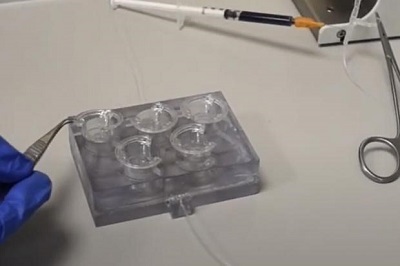London, (Asian independent) UK scientists have developed a pioneering 3D-printed “body-on-chip” device that mimics the effect of medicines on the human body, eliminating the need for animal testing.
The plastic device, invented by researchers at the University of Edinburgh, using a 3D printer.
The chip has five compartments that replicate the human heart, lungs, kidney, liver and brain. They are connected by channels that mimic the human circulatory system, through which new drugs can be pumped, the Guardian reported.
It uses positron emission tomography (PET) scanning to produce detailed 3D images showing what is going on inside the tiny organs.
“PET imagery is what allows us to ensure the flow (of new drugs being tested) is even,” Liam Carr, the inventor of the device, was quoted as saying.
Worldwide medicines are first tested on animals, often with no clinical benefit. PET scanning involves injecting tiny amounts of radioactive compounds into the chip to transmit signals to an extremely sensitive camera, allowing scientists to better assess the effect of new drugs.
This can help scientists test drugs to see how different organs react without the need for live animal testing, the report said.
“This device is the first to be designed specifically for measuring drug distribution, with an even flow paired with organ compartments that are large enough to sample drug uptake for mathematical modelling. Essentially, allowing us to see where a new drug goes in the body and how long it stays there, without having to use a human or animal to test it,” Carr said.
The platform is completely flexible and can be a valuable tool to investigate various human diseases, such as cancer, cardiovascular diseases, neurodegenerative diseases and immune diseases.
Carr’s supervisor, Dr Adriana Tavares, of Edinburgh’s Centre for Cardiovascular Science (CVS), said linking five organs together on one device would help scientists effectively study how a new drug might affect a patient’s whole body.
“Devices such as the body-on-chip platform are essential to unravel the mechanisms underlying systemic effects of local diseases as well as investigate off-target effects of drugs, which might be therapeutically useful or detrimental,” she was quoted as saying.








